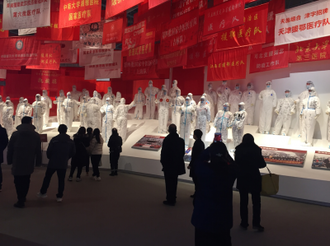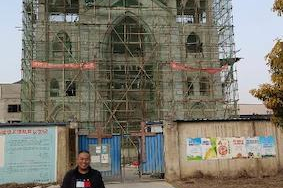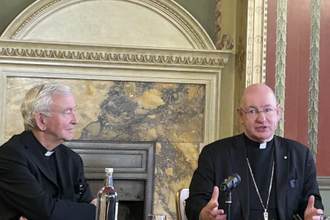Reflection from Wuhan: One year on from start of Covid-19

Exhibition in Wuhan shows how Covid-19 was brought under control
Our correspondent in Wuhan writes: This morning as I changed from Wuhan's Metro line seven to line four I noticed that several people were moving quickly to make the transfer, presumable trying to get to work on time. Exactly one year ago many people were also darting their way through the city's transport system trying to meet a deadline. However, on that day the reason was totally different. The 23rd of January last year is etched on the minds of people in Wuhan, the day an announcement was made that the city's transport system would shut down at ten o'clock that morning as part of the sudden introduction of severe measures to curb the spread of a virus that had initially only received moderate levels of public attention in China. The decision to lockdown a city of eleven million people and extend the same measures to the rest of the province and the country sent a shockwave of seismic proportions through China.
As the withering restrictions on personal movement moved from days to weeks, the daily reports of new case numbers eventually showed signs of moving in the right direction. As the case numbers declined in China, anxiety rose in other countries as COVID-19 showed that it is completely blind to international borders, needing only the slightest opportunity to bridge any distance with the unintentional help of human contact.
Over the last few days I met a number of people who recalled what they were doing in the days prior to the lockdown and what was happening for them during the early days of restriction. One young mother spoke of the relief of moving just before the lockdown to her husband's village of origin outside Wuhan to be with his parents for the lunar new year celebration, that location offering a simple but more spacious location for their child compared to the confinement of a city apartment. The owner of a small hardware shop where I occasionally buy a few items spoke this morning about the struggle to pay substantial rent at a time when there was no income. Last night a Catholic recalled how she helped at one of the construction sites where an emergency hospital was built in ten days, her skills as an engineer encouraging her to volunteer her expertise in her company's contract for the project, only to discover upon arrival at the construction site that she needed to carve out her own niche to assist in the unceasing and exhausting hive of activity where social distancing was set aside in favour of getting the project completed.
Churches in Wuhan that had to close their doors left communities of Catholics unable to gather for the first time in forty years, one of their few consolations being that some hospitals originally set up by the Church a century ago were now at the centre of treating patients in the unfolding pandemic.
Knowing two families bereaved during the early weeks of the pandemic in Wuhan is a stark reminder for me that this has been a shattering year for those who have been closest to the effects of the medical emergency, both of these families involving the older generation grieving for the younger generation.
One event that many Catholics in Wuhan spoke about during the past year was the Lenten liturgy led by Pope Francis in a deserted St. Peter's Square. That dark wet night in Rome seemed so appropriate to convey the gravity of the situation as he offered prayers for the whole world.
China's intense control measures for the first three months of the pandemic eventually led to a cautious return to many aspects of normal living by mid-April. An indication that the authorities now believe that the main task of containing the virus has been achieved can be gauged by the way an exhibition has recently opened in Wuhan to explain how the civil authorities and medical professionals brought the situation under control. Walking through the spacious exhibition halls and observing the meticulously prepared display boards and reconstructed medical wards is like an experience of absorbing the message that China is now looking back on an event as if it were being presented in a museum, an event portrayed as getting to this stage due to strong leadership from the highest political level.
While a second wave is unlikely to be given the opportunity to emerge on a serious scale in China, it is obviously going to take much longer for all countries to get to the stage of deciding how to honour the dedicated efforts made by their own people to stop the medical and emotional havoc caused by the pandemic.tAs a team of experts from the World Health Orgainisation prepares to begin its research into the early days of the virus being noticed in Wuhan, there have been conflicting suggestions by others about the real origin of the pandemic. Rather than be distracted by conflicting and unsubstantiated claims about the origin of the virus, perhaps the world would be better served if positive developments from various parts of the world were highlighted a little bit more, whether these be China's ability to contain COVID-19 with eleven weeks of severe restrictions, the breathtaking pace at which research teams have developed vaccines, or the depths of compassion shown by so many communities around the world for those who have been bereaved. Irrespective of some of the questions that are still waiting to be answered, there are plenty of reminders for us during the past year that we belong to a global family where the well-being of each person depends on the well-being of all.


















